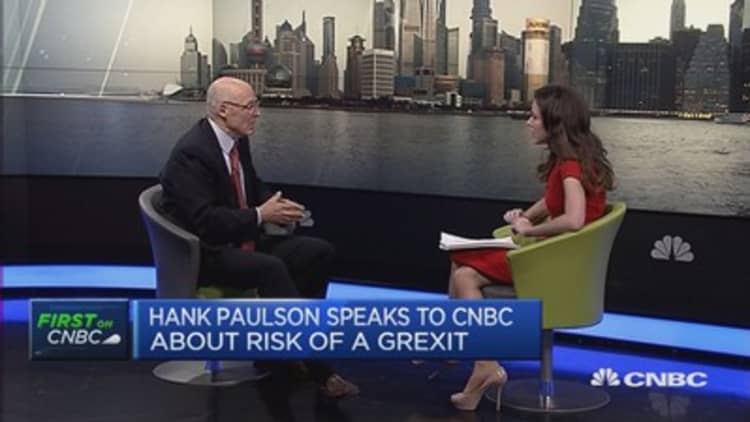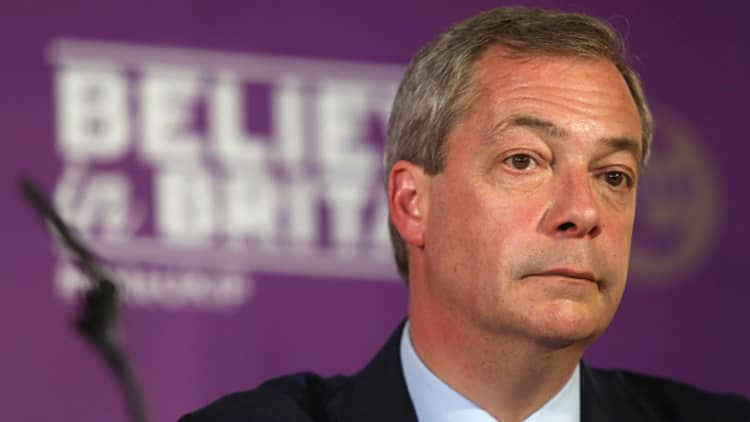A populist surge in Europe that seemed unstoppable just a short while ago appears to be floundering.
Greece's left-wing Syriza party, which catapulted to power in January on an anti-austerity ticket, has seen its popularity fall as it tries to avert bankruptcy and last week, the U.K. Independence Party (UKIP) emerged from a general election with just one seat in parliament.
Across the Channel, France's far-right Front National is locked in a bitter dispute between the party's founder Jean-Marie Le Pen, and his daughter, Marine, the current leader.
In Spain meanwhile, the spectacular rise last year of the anti-austerity Podemos party has been stalled in 2015 by allegations of corruption, the country's economic recovery and the emergence of a new party called Ciudadanos or "Citizens."
Read MoreGreece clears IMF hurdle but don't relax just yet
"These populist forces in Europe are still strong, but I don't think they will get into a significant position in government as they have done in Greece," Antonio Roldan Mones, an analyst at Eurasia Group, told CNBC.
"In Spain, support for Podemos is not going to continue in the same way because the economy is recovering and it is being constrained by a new party, while in France the Front National did well in last year's European elections but is unlikely to get into government."
Stalled
The 2007-08 global financial crisis and subsequent austerity measures fuelled the rise of several populist movements in Europe and forced mainstream parties to adopt tougher stance on issues of popular concern such as immigration.

However, analysts said that now, populist parties were hindered by their lack of a coherent economic agendas and politicians that lacked experience. In addition, electoral systems, such as the U.K.'s "first past the post" may hamper smaller parties' ability to gain representation in parliament.
Read MoreHas Krugman been proved wrong on austerity?
"I don't think that populist parties will have a long-lasting effect on the party system (not policy), because a) they cannot recruit their leadership from a large and experienced base and therefore often rise and fall with charismatic individuals, as well as disappoint when included in government (as seen in Germany, Austria). Also, b) established parties adapt their strategies to recapture voters (as seen in U.K.) and c) the electoral system makes it difficult to succeed (e.g. first pass the post in the U.K.)," said Mareike Kleine, associate professor of European Union and international politics at the LSE European Institute.

In the U.K. system, the candidate with most votes in a constituency wins—and all other votes in that area count for nothing. This meant that after last week's election, UKIP holds just one seat, despite receiving almost 4 million votes and fielding candidates who came second in a number of constituencies.
Elsewhere in Europe, Italy's Five-Star Movement, led by comedian Beppe Grillo, has faded, despite gaining considerable traction two years ago. In Germany, Pegida, a populist anti-"Islamisation" movement, was thrown into disorder in January after its leader quit after it was found that he had photographed himself posing as Hitler.
No spent force
Still, analysts said populist parties were impacting governmental policy and that this was likely to continue for a while.
"Our longstanding view has been that non-mainstream parties such as UKIP and the National Front (in France) would influence the political debate and increase the trend of political fragmentation… resulting in weaker governments overall, but without winning power," Tina Fordham, chief political analyst at Citi, told CNBC.
That fragmentation is something that is likely to be seen in Spain's general election later this year, said Nicholas Spiro, managing director at Spiro Sovereign Strategy.
He said Spain's two big political parties – the conservative People's party and the Socialist Party – would face stiff competition from populist parties Podemos and Ciudadanos.
"We are likely to see a deeply fragmented parliament in Spain after the elections," Spiro told CNBC. "A Rubicon will be crossed in Spain, which has been dominated by two parties for decades."
Meanwhile, UKIP leader, Nigel Farage, seemed unperturbed by failing to gain a seat in last week's election. Having resigned as party leader on his defeat in the constituency of South Thanet, he was reinstated on Monday after UKIP refused to accept his abdication.


